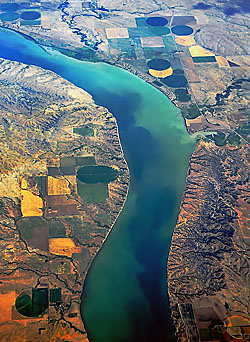 | The excess water being pumped into the Mississippi affects the ocean's acidity, say researchers. |
Midwestern farming has introduced the equivalent of five Connecticut Rivers
into the Mississippi River over the past 50 years and is adding more carbon
dioxide annually into its waters, according to a study published in Nature
by researchers at Yale and Louisiana State universities.
T H I S
IN MEMORIAM
Study: Farming is changing
chemistry of Mississippi River
“It’s like the discovery of a new large river being piped out of
the corn belt,” says Pete Raymond, lead author of the study and associate
professor of ecosystem ecology at the Yale School of Forestry & Environmental
Studies (F&ES). “Agricultural practices have significantly changed
the hydrology and chemistry of the Mississippi River.”
The researchers tracked changes in the levels of water and bicarbonate, which
forms when carbon dioxide in soil water dissolves rock minerals. Bicarbonate
plays an important, long-term role in absorbing atmospheric carbon dioxide,
a greenhouse gas. Oceans then absorb the excess carbon dioxide and become more
acidic in the process.
“Ocean acidification makes it more difficult for organisms to form hard
shells in coral reefs,” notes R. Eugene Turner, a co-author of the study
and a professor at the Coastal Ecology Institute at Louisiana State University.
The researchers concluded that farming practices such as liming, changes in tile
drainage, and crop type and rotation are responsible for the majority of the
increase in water and carbon dioxide in the Mississippi River, which is North
America’s largest river.
Raymond says that the research team analyzed 100-year-old data on the Mississippi
River, warehoused at two New Orleans water treatment plants, along with data
on precipitation and water export. “A notable finding is that changes in
farming practices are more important than changes in precipitation to the increase
in water being discharged into the river,” he says.
The researchers used their data to demonstrate the effects of excess water on
the carbon content of the river, and to argue that nutrients and pollution in
the water are altering the chemistry of the Gulf of Mexico.
The other authors of the study are Neung-Hwan Oh of F&ES and Whitney Broussard
of the Department of Oceanography and Coastal Sciences at Louisiana State University.
A grant from the National Science Foundation funded the research. W E E K ' S
W E E K ' S S T O R I E S
S T O R I E S![]()
 University has reduced its greenhouse gas emissions by 17% . . .
University has reduced its greenhouse gas emissions by 17% . . .![]()
![]()
 New endowed chair honors Marie Borroff
New endowed chair honors Marie Borroff![]()
![]()
 Initiative to boost humanities-professional school interaction
Initiative to boost humanities-professional school interaction![]()
![]()
 Faculty survey to be starting point for ‘self-evaluation’
Faculty survey to be starting point for ‘self-evaluation’![]()
![]()
 In Focus: Peking-Yale Joint Undergraduate Program
In Focus: Peking-Yale Joint Undergraduate Program![]()
![]()
 Forming bonds in China: Students hail their immersion experience
Forming bonds in China: Students hail their immersion experience![]()
ENDOWED PROFESSORSHIPS![]()
 Yale Press to create digital edition of Soviet leader Stalin’s . . .
Yale Press to create digital edition of Soviet leader Stalin’s . . .![]()
![]()
 Switzerland tops experts’ index of global environmental leaders
Switzerland tops experts’ index of global environmental leaders![]()
![]()
 Levin urges rededication to Martin Luther King Jr.’s ‘dream’
Levin urges rededication to Martin Luther King Jr.’s ‘dream’![]()
![]()
 Paula Vogel to head School of Drama’s playwriting department
Paula Vogel to head School of Drama’s playwriting department![]()
![]()
 Study shows elderly with low vitamin E levels are . . .
Study shows elderly with low vitamin E levels are . . .
![]()
![]()
 Researchers identify key factor in stress effects on the brain
Researchers identify key factor in stress effects on the brain![]()
![]()
 Exhibits explore British artists’ images of the Middle East
Exhibits explore British artists’ images of the Middle East![]()
![]()
 Drama School stages Ibsen’s ‘Peer Gynt,’ an exploration of . . .
Drama School stages Ibsen’s ‘Peer Gynt,’ an exploration of . . .![]()
![]()
 Poetry and visual arts are united in library exhibitions’ . . .
Poetry and visual arts are united in library exhibitions’ . . .![]()
![]()
 Teaching fellowship winners are urged to ‘create passion’
Teaching fellowship winners are urged to ‘create passion’![]()
 H. Bradford Westerfield: Intelligence expert, taught top leaders
H. Bradford Westerfield: Intelligence expert, taught top leaders![]()
 Victor Erlich: Helped bring Slavic department to prominence
Victor Erlich: Helped bring Slavic department to prominence![]()
 R. Lansing Hicks: Renowned at YDS for his teaching, integrity
R. Lansing Hicks: Renowned at YDS for his teaching, integrity![]()
 Parker Po-Fei Huang: Poet and pioneer in Chinese . . .
Parker Po-Fei Huang: Poet and pioneer in Chinese . . .![]()
![]()
 Yale Books in Brief
Yale Books in Brief![]()
![]()
 Campus Notes
Campus Notes![]()
Bulletin Home |
| Visiting on Campus
Visiting on Campus |
| Calendar of Events
Calendar of Events |
| In the News
In the News![]()
Bulletin Board |
| Classified Ads
Classified Ads |
| Search Archives
Search Archives |
| Deadlines
Deadlines![]()
Bulletin Staff |
| Public Affairs
Public Affairs |
| News Releases
News Releases |
| E-Mail Us
E-Mail Us |
| Yale Home
Yale Home